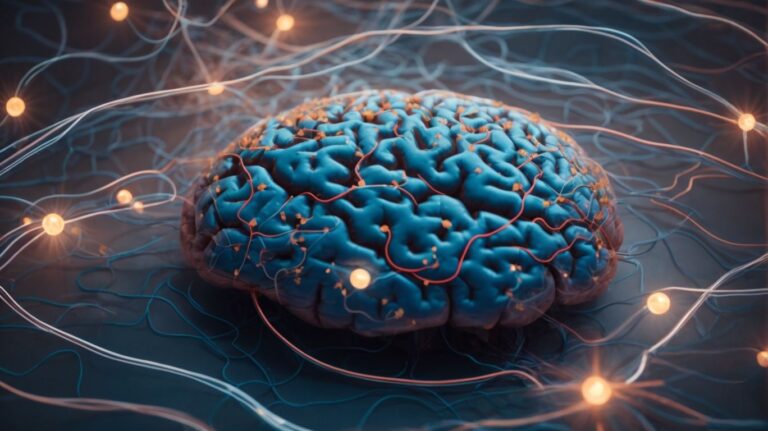Bulimia Nervosa is a complex eating disorder with various underlying factors that contribute to its development. From biological influences to societal pressures, this article explores the different causes of bulimia nervosa.
We delve into the symptoms of this disorder, including binge eating and purging behaviors. Understanding the mental health effects of bulimia nervosa, such as depression and anxiety, is crucial in recognizing the importance of timely diagnosis and treatment options.
Join us as we discuss the various ways in which bulimia nervosa can be treated and how loved ones can offer support to those struggling with this disorder.
Contents
- 1 What is Bulimia Nervosa?
- 2 What Causes Bulimia Nervosa?
- 3 What Are the Symptoms of Bulimia Nervosa?
- 4 How is Bulimia Nervosa Diagnosed?
- 5 What Are the Effects of Bulimia Nervosa on Mental Health?
- 6 How is Bulimia Nervosa Treated?
- 7 How Can Family and Friends Support Someone with Bulimia Nervosa?
- 8 Frequently Asked Questions
- 8.1 What is Bulimia Nervosa and how is it different from other eating disorders?
- 8.2 What are some common signs and symptoms of Bulimia Nervosa?
- 8.3 What are some possible causes of Bulimia Nervosa?
- 8.4 How does the psychology behind Bulimia Nervosa affect its development and treatment?
- 8.5 What are the potential consequences of Bulimia Nervosa?
- 8.6 Can Bulimia Nervosa be cured?
What is Bulimia Nervosa?
Bulimia Nervosa is a serious eating disorder characterized by recurrent episodes of binge eating followed by compensatory behaviors like purging, fasting, or excessive exercise.
Individuals with Bulimia Nervosa often feel a lack of control during binge episodes and use purging methods to prevent weight gain. This condition affects mostly young women, but can also occur in men, with a prevalence estimated to be around 1-2% of the general population.
The diagnostic criteria for Bulimia Nervosa include recurrent episodes of binge eating, followed by inappropriate compensatory behaviors to prevent weight gain, such as self-induced vomiting or misuse of laxatives. One of the key features is a preoccupation with body shape and weight, leading to distorted self-perception.
Cognitive-behavioral therapy is a commonly used treatment for individuals with Bulimia Nervosa, focusing on addressing maladaptive thoughts and behaviors related to food and body image. The therapy aims to modify dysfunctional beliefs and develop healthier coping mechanisms.”
What Causes Bulimia Nervosa?
The causes of Bulimia Nervosa are multifaceted, involving biological, psychological, and sociocultural factors that contribute to the development and maintenance of this eating disorder.
Biological vulnerabilities play a significant role in the onset of Bulimia Nervosa, with genetic predispositions and imbalances in neurotransmitters affecting an individual’s susceptibility. Psychological influences stemming from self-esteem theory and interpersonal theory contribute to distorted body image perceptions and maladaptive coping mechanisms.
Societal pressures, including media portrayals of unrealistic beauty standards, also play a crucial role in fueling the development of Bulimia Nervosa by influencing individuals’ expectations and cognitive flexibility in dealing with stress and emotions.
Biological Factors
Biological factors play a crucial role in the development of Bulimia Nervosa, including genetic predispositions, abnormalities in neural processing, and disturbances in cognitive functioning.
Research suggests that individuals with Bulimia Nervosa may exhibit specific genetic markers that predispose them to this disorder. Additionally, body dissatisfaction and emotional dysregulation further contribute to the interplay between genetics and psychological disturbances in the manifestation of the disorder. The emotion regulation theory posits that deficits in effectively managing emotions may lead to maladaptive coping mechanisms, such as binge eating and purging behaviors.
Studies have indicated that individuals with Bulimia Nervosa often struggle with cognitive impairments related to decision-making processes and impulsivity. Neurobiological research has also highlighted alterations in brain regions involved in reward processing and self-control among individuals with this disorder.
Psychological Factors
Psychological factors such as low self-esteem, poor emotional regulation, and distorted body image perceptions contribute significantly to the development and maintenance of Bulimia Nervosa.
Individuals struggling with Bulimia Nervosa often experience a persistent sense of perfectionism, where unrealistically high standards for themselves lead to feelings of inadequacy and failure. This perpetual self-criticism can exacerbate low self-esteem and foster a negative self-image, prompting them to resort to purging behaviors as a form of control.
Emotional stress reactivity plays a crucial role in this disorder. Those with Bulimia Nervosa may exhibit heightened emotional sensitivity and difficulty regulating their emotions, using bingeing and purging as maladaptive coping mechanisms to manage distress.
Sociocultural Factors
Sociocultural factors, including societal beauty standards, media influences, and cultural norms around body image, play a significant role in the development of Bulimia Nervosa.
Over-vigilance towards appearance and weight can lead individuals to adopt extreme measures to conform to unrealistic beauty ideals perpetuated by society, fostering a sense of inadequacy and discontent with one’s body.
This cognitive inflexibility, exacerbated by societal pressures, contributes to the reinforcement of disordered eating patterns seen in Bulimia Nervosa.
The influence of media on body image perceptions shapes how individuals view themselves, often promoting unattainable standards that fuel feelings of dissatisfaction.
Cultivating self-compassion techniques and challenging detrimental social concepts can be pivotal in addressing the root causes of this eating disorder.”
What Are the Symptoms of Bulimia Nervosa?
Symptoms of Bulimia Nervosa include recurrent episodes of binge eating, followed by compensatory behaviors such as purging, fasting, or excessive exercise.
Individuals with Bulimia Nervosa often experience feelings of lack of control during binge episodes, where they consume large amounts of food rapidly, usually in secret. After binge eating, feelings of guilt, shame, and distress may contribute to the initiation of compensatory measures. These psychiatric symptoms can lead to a vicious cycle, impacting both physical and mental well-being. The core symptoms of Bulimia Nervosa revolve around the alternating phases of binge eating and purging, causing serious health consequences if left untreated.
Binge Eating
Binge eating in Bulimia Nervosa involves consuming large amounts of food in a discrete period, often feeling a lack of control over eating behavior.
Individuals with this eating disorder may experience intense shame and distress following a binge episode. The patterns and characteristics of binge eating in Bulimia Nervosa can vary from person to person, but commonly include episodes of rapid food consumption without physiological hunger, often in secret.
Triggers for binge eating can range from emotional stress and negative body image to restrictive dieting behaviors. The detrimental consequences of binge eating may lead to physical health issues such as obesity, diabetes, and heart disease, as well as psychological impacts such as guilt, depression, and anxiety.
Cognitive-behavioral therapy is a prevalent treatment approach for addressing binge eating in Bulimia Nervosa. This therapeutic method aims to help individuals modify their dysfunctional thoughts and behaviors related to eating, addressing underlying issues through techniques such as self-monitoring, cognitive restructuring, and problem-solving strategies. Integration of latent variable theory and network theory in treatment models can provide a deeper understanding of the interconnected factors influencing binge eating behaviors, offering more effective and personalized interventions for individuals with Bulimia Nervosa.
Purging Behaviors
Purging behaviors in Bulimia Nervosa involve self-induced vomiting, laxative use, or excessive exercise to compensate for binge eating episodes.
These purging behaviors are detrimental to one’s physical health as they can lead to electrolyte imbalances, dehydration, erosion of tooth enamel, and gastrointestinal issues.
Medications like selective serotonin reuptake inhibitors such as fluoxetine and sertraline have been found to be beneficial in treating Bulimia Nervosa by helping to reduce binge-eating episodes and the urge to engage in purging behaviors. These medications work by altering neurotransmitter levels in the brain to regulate mood and behavior.
Excessive Exercise
Excessive exercise is a common compensatory behavior in Bulimia Nervosa, driven by the need to burn off calories consumed during binge eating episodes.
Individuals with Bulimia Nervosa often engage in intense workouts as a means of purging the food they have consumed, leading to a harmful cycle of bingeing and excessive exercising.
This behavior not only places a strain on the body, increasing the risk of physical injuries and exhaustion, but it also has detrimental effects on mental health, contributing to feelings of guilt and anxiety.
Psychopathology networks in Bulimia Nervosa play a crucial role in perpetuating this harmful behavior, reinforcing the association between exercise and purging.
Therapeutic approaches like the Maudsley method focus on restoring healthy eating patterns and challenging distorted beliefs surrounding food and exercise, aiming to improve cognitive functioning and overall well-being.
Preoccupation with Body Image
Individuals with Bulimia Nervosa often experience significant body dissatisfaction, exhibiting a distorted view of their physical appearance influenced by societal standards and internalized beliefs.
This preoccupation with body image can lead to harmful behaviors like self-induced vomiting, excessive exercise, and misuse of laxatives.
Emotional regulation plays a crucial role in the development and maintenance of this disorder. Individuals with Bulimia Nervosa may use bingeing and purging as maladaptive coping mechanisms for dealing with negative emotions and stress. Cognitive distortions, such as dichotomous thinking and overgeneralization, further perpetuate the dysfunctional beliefs about body image.
How is Bulimia Nervosa Diagnosed?
Bulimia Nervosa is typically diagnosed based on the presence of specific psychiatric symptoms outlined in the DSM-IV criteria for eating disorders.
When assessing for Bulimia Nervosa, healthcare professionals look for recurrent episodes of binge eating, followed by inappropriate compensatory behaviors like self-induced vomiting or misuse of laxatives. The continuum of criteria includes an intense fear of gaining weight, a distorted body image, and the inability to control these behaviors. It’s crucial to differentiate Bulimia Nervosa from other eating disorders like Anorexia Nervosa or Binge Eating Disorder through a comprehensive evaluation.
Psychopathology research has shown that individuals with Bulimia Nervosa often suffer from underlying mood disorders, anxiety, or impulsivity. Therefore, treatment approaches may combine cognitive-behavioral therapy, nutritional counseling, and medication to address both the eating disorder symptoms and any co-occurring mental health issues.
What Are the Effects of Bulimia Nervosa on Mental Health?
Bulimia Nervosa can have detrimental effects on mental health, leading to increased rates of depression, anxiety disorders, and substance abuse among individuals with the disorder.
Moreover,
- Bulimia Nervosa is associated with a range of comorbid conditions, such as gastrointestinal issues, electrolyte imbalances, and dental problems due to purging behaviors.
- The psychological toll of the disorder can result in social isolation and impaired quality of life for those affected.
Understanding these interconnected factors requires a nuanced approach, where network analysis and partial correlation networks can provide valuable insights into the complex relationship between symptomatology and mental health outcomes.
Depression
Depression is a common comorbidity in individuals with Bulimia Nervosa, characterized by persistent feelings of sadness, hopelessness, and low self-worth.
This co-occurrence has led researchers to delve deeper into the intricate relationship between these two conditions. Studies have indicated that there are shared etiological factors contributing to both Bulimia Nervosa and depression, such as genetic predisposition, neurobiological abnormalities, and environmental triggers. Individuals with Bulimia Nervosa often struggle with emotion regulation mechanisms, which can exacerbate depressive symptoms. Treatment strategies for these coexisting conditions may involve a combination of psychotherapy, medication like SSRI, and interventions targeting neural processing to address underlying mechanisms.
Anxiety
Anxiety disorders frequently co-occur with Bulimia Nervosa, manifesting as excessive worry, fear, and avoidance behaviors in response to perceived threats.
This comorbidity can be attributed to certain shared vulnerabilities and cognitive distortions that underlie both conditions. Individuals with Bulimia Nervosa often exhibit cognitive inflexibility, struggling with rigid thinking patterns and difficulties adapting to changing situations. Similarly, anxiety disorders are associated with impaired cognitive flexibility, making it challenging for individuals to shift their attention and responses when faced with stress or uncertainty.
Substance Abuse
Substance abuse is a common issue among individuals with Bulimia Nervosa, often used as a maladaptive coping mechanism to regulate emotions and cope with distress.
Individuals with Bulimia Nervosa may resort to substances such as alcohol or drugs to numb their emotional pain and distract themselves from underlying issues. This behavior is often linked to emotional dysregulation, where the individual struggles to effectively manage their feelings and reactions. Impulsive behaviors, such as binge eating followed by purging, are also common characteristics of Bulimia Nervosa, further exacerbating the cycle of self-destructive tendencies. Therapeutic approaches for treating Bulimia Nervosa must address not only the eating disorder itself but also the underlying emotional vulnerabilities, including working on reducing over-vigilance and perfectionistic tendencies.
How is Bulimia Nervosa Treated?
Treatment for Bulimia Nervosa typically involves a combination of psychotherapies, medication management, and nutritional counseling to address the core symptoms and underlying factors contributing to the disorder.
Cognitive-behavioral therapy (CBT) is often utilized to help individuals challenge and change unhealthy thoughts and behaviors related to food and body image. This therapy focuses on identifying triggers and developing coping mechanisms.
Selective serotonin reuptake inhibitors (SSRIs) may be prescribed to regulate mood and reduce binge-purge cycles. In some cases, dietary interventions are implemented to establish regular eating patterns and balanced nutrition.
Another approach gaining recognition is the Maudsley approach, which involves family-based therapy to support the individual towards recovery.
Therapy
Therapeutic interventions like Cognitive-Behavioral Therapy (CBT) and Family-Based Therapy are commonly used to address the underlying psychological factors and dysfunctional behaviors associated with Bulimia Nervosa.
These therapies play a crucial role in the treatment of Bulimia Nervosa by targeting the cognitive distortions and maladaptive behaviors that contribute to the development and maintenance of the disorder. CBT, in particular, focuses on identifying and challenging the negative thought patterns and beliefs that drive the cycle of bingeing and purging.
Family-Based Therapy, on the other hand, involves the direct involvement of family members in the treatment process to create a supportive environment for the individual struggling with Bulimia Nervosa. It aims to improve communication, set appropriate boundaries, and foster healthier eating habits within the family unit.
Medication
Selective Serotonin Reuptake Inhibitors (SSRIs) such as fluoxetine are often prescribed to individuals with Bulimia Nervosa to target co-occurring mood disorders and regulate binge-purge cycles.
In cases where fluoxetine is not well-tolerated or ineffective, other SSRIs like sertraline may be considered as an alternative. Studies have shown that sertraline can also help reduce binge eating episodes and improve overall psychological well-being in individuals with Bulimia Nervosa. For those who do not respond adequately to SSRIs, medications such as topiramate may be explored. Topiramate, primarily used for epilepsy, has shown some promise in reducing binge eating behaviors and promoting weight loss in individuals with eating disorders.
Nutritional Counseling
Nutritional counseling plays a vital role in the treatment of Bulimia Nervosa, helping individuals develop healthy eating habits, restore nutritional balance, and cultivate cognitive flexibility around food and body image.
Self-compassion techniques are pivotal in nutritional counseling for individuals with Bulimia Nervosa, guiding them towards a more positive self-image and reducing the harsh self-criticism often associated with disordered eating patterns. Inhibition strategies, such as incorporating mindful eating practices and setting meal structure, assist in normalizing eating behaviors and promoting a healthier relationship with food and eating routines.
How Can Family and Friends Support Someone with Bulimia Nervosa?
Support from family and friends is crucial in the recovery journey of individuals with Bulimia Nervosa, offering emotional encouragement, practical assistance, and a supportive environment for healing.
Research in psychopathology has shown that a strong social support network can significantly impact the recovery outcomes for those battling Bulimia Nervosa.
Empathetic communication plays a vital role in providing the necessary emotional backing, reassuring individuals that they are not alone in their struggle. Families and friends can help by avoiding over-vigilance and instead focus on creating a nurturing and understanding atmosphere that fosters positive treatment experiences. Encouraging open dialogue and honest conversations can lead to stronger connections and a sense of shared responsibility in the recovery process.
Frequently Asked Questions
What is Bulimia Nervosa and how is it different from other eating disorders?
Bulimia Nervosa is an eating disorder characterized by a cycle of binge eating followed by purging behaviors such as self-induced vomiting or misuse of laxatives. It is different from anorexia nervosa in that people with bulimia typically maintain a normal or slightly above normal weight, and different from binge eating disorder in that bulimics typically engage in compensatory behaviors to “make up” for the binge episode.
What are some common signs and symptoms of Bulimia Nervosa?
Signs and symptoms of Bulimia Nervosa may include: recurrent episodes of binge eating, a sense of lack of control during binging, compensatory behaviors such as self-induced vomiting, misuse of laxatives or diuretics, extreme concern with body image and weight, and feelings of guilt or shame after bingeing.
What are some possible causes of Bulimia Nervosa?
The exact cause of Bulimia Nervosa is unknown, but it is believed to be a combination of genetic, biological, psychological, and environmental factors. Some possible contributing factors may include low self-esteem, history of traumatic events, cultural pressure to be thin, and family history of eating disorders.
How does the psychology behind Bulimia Nervosa affect its development and treatment?
The psychology behind Bulimia Nervosa plays a significant role in both its development and treatment. Individuals with this disorder often struggle with negative self-image and low self-esteem, which can contribute to the cycle of binging and purging. Therapy and counseling are important components of treatment, as they can address underlying psychological factors and help individuals develop healthier coping mechanisms.
What are the potential consequences of Bulimia Nervosa?
Bulimia Nervosa can have serious physical and psychological consequences. Frequent purging can lead to electrolyte imbalances, dehydration, and damage to the digestive system. It can also affect mental health, leading to depression, anxiety, and social isolation. If left untreated, bulimia can have long-term effects on overall health and well-being.
Can Bulimia Nervosa be cured?
While there is no one-size-fits-all cure for Bulimia Nervosa, it is a treatable disorder. With proper support, therapy, and a personalized treatment plan, individuals can learn to manage their symptoms and lead a fulfilling life. It is important for individuals to seek help and support from healthcare professionals and loved ones to overcome this disorder.



